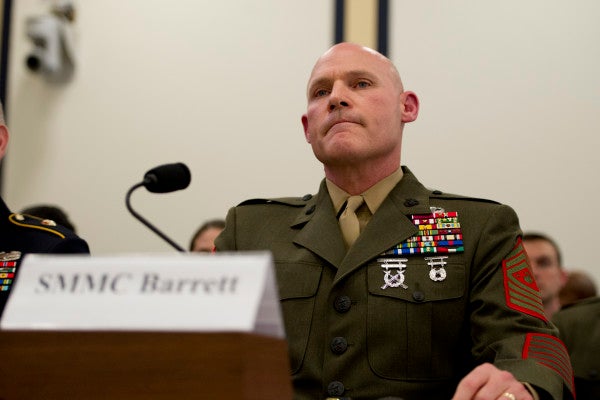The Sergeant Major Of The Marine Corps Is Dead Wrong About Cutting Troop Pay
The Sergeant Major of the Marine Corps, Sgt. Maj. Micheal Barrett, raised a few eyebrows on Capitol Hill with his...

The Sergeant Major of the Marine Corps, Sgt. Maj. Micheal Barrett, raised a few eyebrows on Capitol Hill with his remarks about proposals to cut the pay of active-duty service men and women.
“I truly believe it will raise discipline,” he said of the proposed cuts, according to Leo Shane III with Military Times. “You'll have better spending habits. You won't be so wasteful.”
“In my 33 years, we've never had a better quality of life,” he added. “We've never had it so good. If we don't get ahold of slowing the growth, we will become an entitlement-based, a health care provider-based Corps, and not a war fighting organization.”
Let me preface what follows by saying that I have the utmost of respect for Barrett and consider him to be among the greatest Marine warriors in my generation of veterans.
But he’s dead wrong on this one.
In considering his claim, I'm reminded of something an outstanding Marine lieutenant colonel once told me about what makes the Marine Corps special:
“The Army talks about their tanks, the Navy talks about their ships, the Air Force talks about their airplanes,” he said. “We have all of those, what do we talk about? We talk about our Marines.”
Barrett’s remarks, and the proposed legislation, could potentially adversely impact the Marine Corps and, by extension, America’s national security. Beyond decreasing the morale of the current rank and file Marines, it also threatens the Corps’ ability to retain its top Marines, and the military’s ability to recruit talented people into its ranks.
Making active-duty members of the military the latest victims of political dysfunction in Washington shouldn’t come as a surprise, but it is particularly hard to bear.
“They want to know about what new equipment are we getting, are we continuing to modernize,” Barrett said. “Just because the budget sucks, does that mean we’re not going to get our new gear?”
In advocating military technological advancement at the expense of the financial welfare of lower ranking enlisted Marines, Barrett is robbing those Marines of his support as their senior enlisted leader, and that's tragic.
Barrett is the Corps' top enlisted Marine, and in that role, is supposed to represent the interests of the enlisted Marines to the Commandant of the Marine Corps and leadership in Washington. No one joins the Marine Corps for the money, and Barrett is right that “Marines don't run around asking about compensation, retirement modernization,” but with all that they are asked to do, Marines need to be compensated fairly for their service. In his role as Sergeant Major of the Marine Corps, Barrett’s should be the loudest of voices against these pay cuts. The answer is not to cut the benefits and pay of troops to fit the confines of the sequester; it is to repeal the sequester.
I love the Marine Corps' culture of austerity. It's central to the expeditionary nature of the Corps. But it is in no way tethered to troop pay. That idea makes no sense, because all troops across all branches are paid the same. Claiming that your discipline is connected to how little money you make is counter to the spirit of capitalism that is central to the American dream and counter to the meritocracy that is central to the military.
Your pay increases as you rise in rank, so by Barrett's logic, he's the least disciplined enlisted member of the Marine Corps.